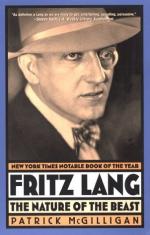|
This section contains 3,296 words (approx. 11 pages at 300 words per page) |

|
[One can see] that Lang's career in the classic German cinema, embracing as it did most of its tendencies, serves in itself as a kind of allegory. In a variety of stylistic disguises the same obsessions appear and recur—in the Nibelungen saga, which added to expressionism an architectural solidity and massive fresco-like sweep, fatality of legend; in the contemporary melodramas, The Spiders, the two Mabuse films, The Spy, fatality of power and violence; in M, fatality of the sadistic inner self; in the early scripts for Joe May and Otto Rippert (Plague in Florence, Woman with the Orchid) and in The Half-Caste and The Master of Love, fatality of sexual domination; in Metropolis, fatality of the machine future. Lang had studied painting and architecture before coming to the cinema, and it is in his legendary and spectacle films, naturally, that a sensuous plastic quality is uppermost, but...
|
This section contains 3,296 words (approx. 11 pages at 300 words per page) |

|


